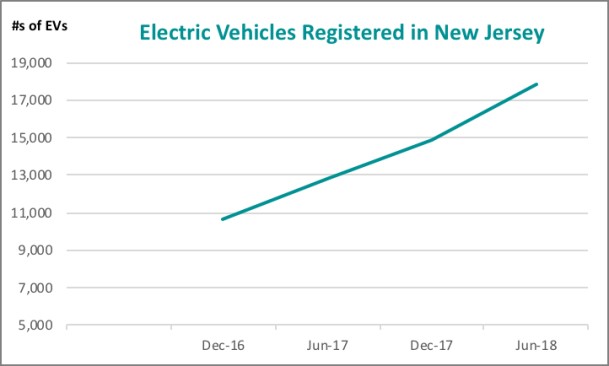VW Draft Plan Jumpstarts EV Transition in NJ
October 9, 2018, Highland Park, NJ: A record number of electric vehicles totaling 17,837, were registered in New Jersey as of the end of June 2018, according to the New Jersey Department of Environmental Protection (www.drivegreen.nj.gov/electric.html). This represents a 40% growth over the last 12 months. While these results demonstrate strong and growing electric vehicle sales, New Jersey is far short of numbers needed to achieve state strategic goals.
The Economic Plan released by the Murphy Administration on October 1, 2018, underscored the goal of more than 300,000 zero emission cars on New Jersey’s roads by 2030. Another push for aggressive policy action on the EV opportunity is found in the Administration’s draft plan, released on October 5, to spend over $72.2M – New Jersey’s initial allocation as a beneficiary of the VW Mitigation Trust Fund administered by the Environmental Protection Agency. “The draft plan is thoughtful in leveraging Volkswagen funds to accelerate electric vehicle growth,” explains Mary Barber, Director of New Jersey Clean Energy at Environmental Defense Fund, and ChargEVC member. Continuing, “By deploying technology to reduce emissions in New Jersey’s most polluted communities, these monies can also help expedite deployment and adoption of zero emission vehicles, which will take more polluting cars, buses and trucks off the road.”
Scott Fisher, Vice-President of Greenlots and officer of ChargEVC, explains, “ChargEVC has worked over the last two years to establish a plan to accelerate electric vehicle adoption including a significant increase in infrastructure to fuel the vehicles.” It is well established that range anxiety, or fear of running out charge is the biggest barrier to electric vehicle adoption. Tracy Noble of AAA and ChargEVC member continues, “Publicly available charging infrastructure on our roads will drive sales of electric vehicles and so we are pleased to see a call for this infrastructure included in the draft.”
The allocation for electric fueling infrastructure is limited by rules of the trust to no more than 15% of the funding. Pamela Frank, CEO of ChargEVC, explains, “While this funding source will not be enough to build out the Essential Charging Public Network called for by ChargEVC that would provide coverage of the state, we expect that gap to be filled by utility filings, such as PSE&G’s filing last week, and Atlantic City Electric filing earlier this year. These filings include working with the private sector and the capital they bring.”
Momentum is building for New Jersey to take bold initiatives to accelerate this market. Expected in the Senate Environment and Energy Committee on October 15th is an omnibus EV bill that will set goals, direct the utilities to make filings establishing the Essential Charging Public Network, and establish a rebate program to make electric vehicles more accessible to mainstream customers.
The national market for EVs continues to grow, with over 44,000 electric vehicles sold in the month of September, doubling the monthly sales year over year. With a first mover advantage in the northeast, New Jersey can get a sizable piece of the action.

